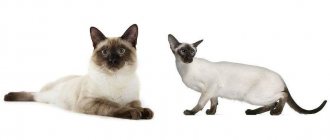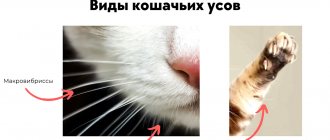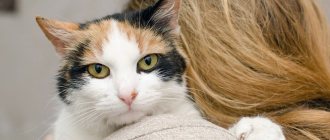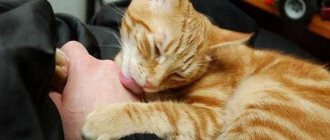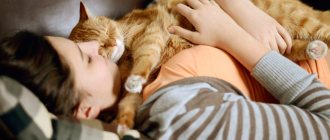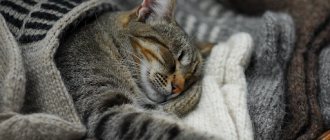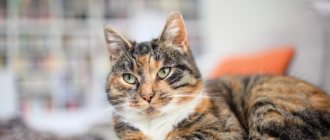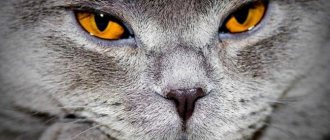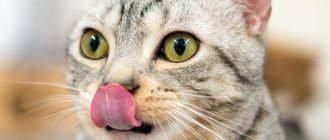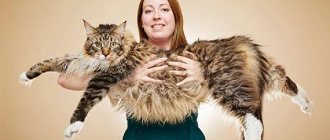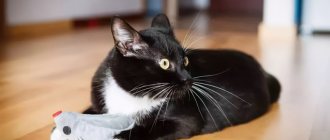I have already written that some cats first like to bite and then lick the owner, but it seems to me that when a cat simply licks hands and fingers, this is somewhat different.
My new pet, the street cat Bjorn, is obsessed with licking. We learned about this passion long before we took him in, but it never went away.
Bjorn not only licks fingers, he also likes plastic bags and plastic. Yes, and he bites often. He likes to chew on everything so much that we bought him toys so he would leave our poor fingers, wires and other dangerous things alone.
Bjorn ignored many of the toys (although our other cats were delighted), but he still liked one thing: chewing sticks. I don’t know whether this is common in other cats or not, tell me, is it also common in yours?
In general, Bjorn often licks the hand with which I stroke him. But he doesn’t mind doing this even when I’m not stroking him, but also, for example, when he licks my clothes. He likes to lick me during some nice moments, and I know it's not because my hands smell like food (although that's one of the reasons, which we'll talk about later).
Sometimes it seems to me that if I had not interrupted Bjorn, he could have continued his licking for half an hour. Now I just say “thank you” and remove my hand and Bjorn stops. But at the beginning of our acquaintance this did not stop him.
I recommend that you come up with some kind of safe word, like “thank you” in my case. The cat will understand that he is not doing anything wrong, but it’s time to stop. Having said your word, immediately remove your hand; the cat will begin to intuitively understand that this means stop.
If Bjorn doesn’t stop, I gently say “okay, ok, that’s enough” and move the cat to another place or cover the area where he was lying. Sometimes you need to offer something in return, but my cat understands everything anyway.
I think there are a number of reasons why cats like to lick fingers and palms, and many overlap. Maybe some are more true than others, but in general they all explain this behavior quite well.
Let's go through the list. And if I missed something or you have other options, write about it!
Feeling from childhood
Owners know that mother cats tirelessly clean and wash their furry babies. This behavior can be compared to parental kisses and hugs in the human world. Accordingly, the cub learns to give warmth and care.
According to eyewitnesses, a person who feeds a kitten from a pipette and replaces its mother cat often becomes the object of strong reciprocal feelings.
The image of a close being imprinted in infancy and the associated pleasures find their manifestation in subsequent communication. Having become accustomed to having a treasured container of milk in a person’s hands, a grown-up cat will purr, caress, lick and suck fingers, anticipating a hearty meal.
The cat shows affection to you
It may not be your first choice, but small bites can be a sign of affection between cats. This is a normal behavioral interaction, especially between kittens. Some cats extend this same behavior to their owners!
If your cat is acting affectionate and then comes over to lick and bite, this is probably what is happening. Although there is no malicious intent behind it, sometimes you don't want to get bitten! In this case, pay attention to the cat's behavior before it approaches you and distract it before it gets to that point. You can still give and receive plenty of affection from your cat—just draw the line at love bites!
The language of communication
Mutual licking is a ritual common to all cats. Thus they strive to:
- Demonstrate the anatomy of feelings . By licking the area of the cheeks, arms, ears and chin, the pet seems to be kissing a person and automatically puts an o.
- Show the owner that he is the closest and dearest . Living as a pet outside of communication with its fellow tribesmen, the cat switches its emotions to humans. Grateful for food and care, the pet tries to be as close to the owner as possible in order to rub its cheek or lick an area of exposed skin: face, neck, fingers, ankle. The sincerity of feelings is indicated by closed eyes and a quietly vibrating “internal motor” that turns on in cats at the moment of receiving positive emotions. Some cats love to lick the hair of their owners, hugging their paws around the neck or sitting next to them on a pillow.
Obeying the basic instinct
The periods of cat “weddings” are known for their riotousness - and individuals of both sexes are prone to an enchanting outpouring of feelings. Expressing desire with inviting cries, characteristic poses and “fragrant” marks, but not being able to find a partner, temperamental pets can “trample” with their paws or bite the owner, lick him annoyingly and rub his whole body, marking him with his smell.
Cats sometimes imitate mounting and mating by squeezing a person's hand with their teeth, just as they would grab the scruff of a cat in heat.
To maintain cleanliness
Self-licking is a natural and very common mechanism for caring for one's own body in the animal kingdom.
Kittens begin to lick themselves from the age of four weeks, and before that, all manipulations regarding the infant toilet are performed by the parent.
Cat licking rituals like these are a demonstration of love for cleanliness:
- The cleanest . Sometimes it seems that keeping oneself clean is the main task of a feline brother. Taking the most graceful poses, Murka licks herself for hours, touchingly washes her face with her paws and rubs her ears. She does this many times a day: after sleeping, feeding, taking care of her natural needs, and even stroking her. A cat's tongue, covered with miniature hooks and therefore rough to the touch, combs and arranges hairs like a brush, removing dirt and foreign odors. During this massage, blood flow is stimulated and the skin glands intensify the production of an oily secretion, which lubricates the hair and protects it from moisture.
- “No” to foreign odors . The desire to lick a person may be motivated by the desire to destroy unusual scent marks. According to the cat's understanding, all perfumes, including perfumes, soaps, shampoos and creams, have unnatural and even unpleasant odors, which must be urgently gotten rid of. This is why the cat spends so much time and carefully licking its own area of the body with medicinal ointment applied to it.
- Tempting aromas . Some cosmetics, on the contrary, can be very attractive to mustachios. Such, for example, is a hand and nail cream with an extract of medicinal valerian, which has a magical effect on cats and activates the owner’s obsessive licking. Some cats love the smell of peony tincture and therefore tend to lick the hands or lips of a person who has taken this sedative. Cats are also attracted to human sweat, which contains odorous substances similar to animal pheromones. So the owner, returning from a morning jog or after a hard work shift, smells very attractive to the murka.
Main reasons
Cats are one of the most independent and self-sufficient pets you can keep at home. Some people periodically feel like they are the ones living with their animal, and not the other way around, they behave so proudly. Therefore, when pets start licking their hands, many people want to think that this is only because of strong love and affection. However, this is not entirely true; there are also other reasons for this.
Expressing affection and care
This behavior is one of the main reasons for licking the head, hands, face, and hair of its owner. A cat avoids people who, for one reason or another, are unpleasant to them. This could be a smell, a neglectful or rude attitude towards an animal, and many others. Therefore, if a pet shows sympathy in this way, there is no need to scold or drive him away. This behavior will cause the animal to lose trust. When it becomes uncomfortable from prolonged licking with a rough and wet tongue, you should not drive the cat away, but divert his attention to a treat or toy.
Maternal instinct
After birth, when kittens are still blind and deaf, they communicate with their mother through tactile interactions. Cats lick their offspring many times a day. This moment remains in the memory of animals for life. When they reach puberty, but do not have kittens for one reason or another, they thus demonstrate maternal instinct. Cats begin to lick their owner, thereby replacing the care of kittens. This seems funny and cute, but this behavior should alert the owner; it can harm the health of the pet. In this connection, veterinarians recommend sterilizing animals at the age of less than 12 months, if matings are not planned in the future.
Lack of attention
When the owner does not give his pet enough attention, this is fraught with damage to furniture, torn wallpaper and loss of mutual understanding with each other. Particularly active individuals can even bite a person. There are several signs that your cat wants affection or play that should not be ignored:
- flattens ears;
- nuzzles hand;
- licks the owner's nose and face.
The pet can lie flat on the floor at the owner’s feet and turn one side or another, as if showing an area of the body where it needs to be stroked or scratched.
Many cats enjoy having their foreheads and ears scratched. Moreover, the fur on the forehead should be stroked against growth, and the ears can be pulled a little. Some pets love it if their belly is touched, others cannot stand it. During molting, animals love to be combed, which is also worth taking into account.
If, when caressed by the owner, the cat begins to purr gently, this indicates that she is happy with everything and is enjoying herself.
You can start stroking without waiting for a call from your pet, but take the initiative yourself. To do this, you need to bring your hand to a distance of about 10 cm from the animal and scratch it nearby; if it reaches out and begins to rub against the owner, then the call for affection has been accepted.
Cat dominance
When licking, sometimes a cat shows its dominant role in the family. In this way she means that this person is her property. At the same time, the pet leaves its scent on the owner. If there are no signs of aggression, there is no need to fight this, as this is normal, because it is not for nothing that everyone knows that a cat is one of the most independent pets.
Anxiety and stress
With increased anxiety and stress, a cat often begins to lick itself and its owner. If such behavior has not been noticed before, or if it was much less so, you need to show the animal to a veterinarian, because this is a symptom indicating the presence of some pathology.
Another reason for this behavior is the animal’s low self-esteem. Licking the owner is a way to win him over and keep him safe. At the same time, the pet is tense and will constantly expect a trick, rather than enjoy communicating with the owner.
Boredom
Some animals, often and for a long time being alone, try to have fun on their own. Some start eating a lot, while others start licking. This is a way to cope with boredom. First, they constantly carry out the washing procedure, and then switch to the owner’s things, as well as hair, hands, face, and the person himself. Sometimes animals go so far as to lick until the hair falls out, followed by the formation of a wound in this place that constantly gets wet. At the same time, they do not stop licking, even in such critical situations.
If this happens to pets, you need to seek veterinary help.
Naturally pungent odor from the owner
Cats have a very highly developed sense of smell, so they can lick the hands, feet, and armpits of their owners who come in the evening after work. The fact is that the smell of sweat formed on the human body during the day is a bait for animals. And by licking it, pets try to protect their owner from persecution by other animals and encroachment on their territory.
Anti-stress therapy
Animal psychologists know that an agitated animal increases the production of saliva and develops a desire to lick itself or surrounding objects:
- Cat auto training . Any monotonous action in an alarming situation leads to a decrease in arousal. Prolonged self-licking of fur, in turn, additionally stimulates sensitive skin receptors and activates the pleasure center in the brain. Thus, a cat experiencing stress turns on its mental defense mechanisms and “withdraws into itself.” With repeated exposure to adverse factors, self-licking can turn into mania, leading to weeping eczema and granuloma.
- Owner-psychotherapist. In an attempt to relieve stress, cats may lick a person's hand. This is exactly how an animal behaves on a trip or during a visit to the veterinarian, provided there is a trusting relationship with the owner. Contact with a familiar palm and pleasant reciprocal stroking of the fur shifts the pet’s attention and has a calming effect.
Doctor cat
Caring for a sore spot and licking a wound is part of the instinct of self-preservation. This is how the animal takes care of itself, trying to heal as best it can. However, as practice shows, a cat tries to cure its beloved owner in exactly the same way:
- Fluffy dermatologist . If your beloved owner has skin diseases or abrasions, the cat can come to the rescue by licking the unhealthy areas. Animals act in a similar way towards each other, expressing their care and psychological support.
- Removing negative energy . There are widely known stories about the mystical ability of cats to heal with touch and “draw out” the energy of the disease from the patient. If a pet constantly lies on a person’s chest or lower back, or relentlessly licks the same area of the body, there is probably something wrong with this area. The biochemistry of the body is disrupted during pathological processes, leading to changes in odor and disruption of the structure of organs, which is recorded by “living devices” tuned by nature.
Disease
Often, in this way, cats ask for help or show a person that there is a problem that requires his urgent intervention. Indeed, by licking, cats are distracted from pain. If such actions are accompanied by chewing of hair, then there is a reason to visit a veterinary clinic. Often similar actions are typical for cats with false pregnancy. This condition is very dangerous for the animal. Therefore, if the licking becomes persistent, immediately show your pet to a doctor.
